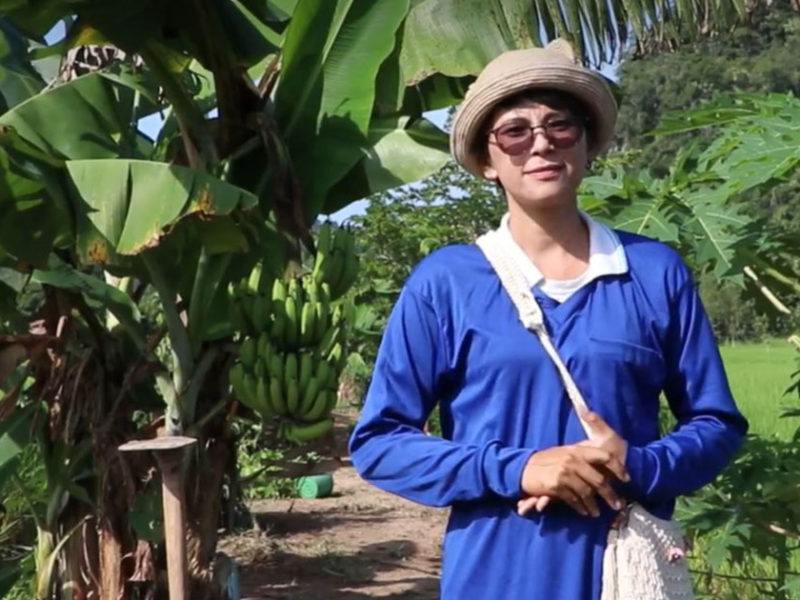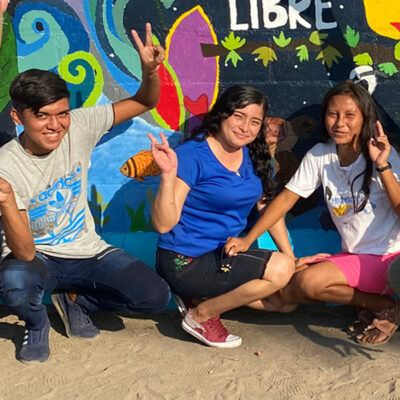Burned fields. Depleted and poisoned waterways. Widespread renal failure. These are just some of the high costs of growing sugarcane in El Salvador—from which the producers profit, and the surrounding communities and environment pay the price.
The sugarcane industry in El Salvador is infamous for its propensity to use any means necessary to increase yield—and thereby, profit—regardless of the harms it causes. Growers use planes and drones to spray fields with toxic pesticides and herbicides that bolster their crops, paying no mind to the mountain of evidence that these chemicals make laborers and communities sick. They burn their fields following each harvest, despite the fact that this practice is illegal and the fires also consume the lands of local people who live nearby—sometimes even spilling into nature reserves. And with sugarcane plots expanding each year—with over 113,000 hectares (approximately 280,000 acres) in the country—the communities and wildlife who suffer at the hands of the industry continue to grow.

To combat these destructive practices, a group of environmental and human rights organizations have banded together, creating the Azúcar Amarga (“Bitter Sugar”) campaign. The members of the campaign, including several AJWS grantee-partners, are using all tools at their disposal to document and shed light on the abuses of the sugarcane industry—and bring an end to the devastation it causes.
Their refrain “¡Otra agricultura es posible, sin monocultivos, ni agroquímicos!” or “Another type of agriculture is possible, without monocultures or agrochemicals!” urges a style of agriculture that doesn’t rely on cultivating a single crop or heavy pesticides. The problems with monoculture are manyfold. For one, it increases the crop’s susceptibility to disease, and thereby, the planters’ use of toxic chemicals to ensure a good yield. In turn, this poisons people, land and water sources alike.
“A few years ago, the sugarcane producers started a strong media campaign to convince the population that sugarcane was not bad,” says Luis González, advocacy director of Unidad Ecológica Salvadoreña (UNES), an AJWS grantee and founding member of the Azúcar Amarga campaign. “They’d feature a farmer saying that sugarcane provided good paid work…they even sold sugarcane as a clean energy crop.”
In response, Azúcar Amarga started their own campaign to spread the truth. “We publish photographs of the forest fires caused by sugarcane burns, of rivers contaminated by agrochemicals, of people’s skin diseases. But we also include the data.”
The campaign is bringing public attention to the environmental and physical abuses of the sugarcane industry, especially the widespread use of agrotoxins—chemicals used as herbicides, pesticides and fertilizers. In an extensive impact study on the environmental and health costs of using agrotoxins published by UNES, they found that the principal toxins used, which have been banned in many other countries, are carcinogens, can lead to fatal poisoning, and are causing an epidemic of chronic kidney failure, especially among field laborers.
Luis elaborates, “In El Salvador, chronic kidney disease is the second cause of hospital deaths in men, and the fourth in women. So we publicize this, along with testimony from people who have suffered from kidney failure for ten years after having worked in the sugarcane fields.”
Beyond causing disease, the mass cultivation of sugarcane also uses a disproportionate amount of water, making it nearly impossible for subsistence farmers to irrigate their plots—and for other ecosystems, such as mangroves, to survive. Because the sugarcane fields continue to expand, they cause ever-worsening deforestation, displacing Indigenous and rural communities from their lands in the process. And the aerial spraying of agrochemicals doesn’t only reach the sugarcane—it also affects surrounding crops.
Pedro Chafoya is the director of communications at ALGES, another member of the Azúcar Amarga campaign and an AJWS grantee. Last year, he interviewed a community member on a radio program to spread awareness about the problem of sugarcane production. “He told me that when he cultivated his cornfield, which is what he and his family subsist on, his plot was next to where the sugarcane plantations began. As the planes passed by, fumigating with the ripening agents and chemicals for the sugarcane, it fell into his cornfield. He lost all his production, his effort, his investment.”

Along with ALGES and UNES, other AJWS partners who are members of the campaign—like FESPAD—are leading these efforts to educate Salvadorans about large-scale sugarcane production and advocate for government intervention. In addition to decrying the ills of agrotoxins, these organizations are spearheading a public uproar against the method of setting fire to sugarcane fields to prepare for planting season. These fires often burn beyond the fields, causing forest fires that kill wildlife and harm the communities whose homes lie mere meters away.
“When the burns begin,” shares Pedro from ALGES, the planters “do not care that there are people who live surrounded by the sugarcane…these families, in addition to inhaling the residue of the burned cane, are also exposed to the high temperatures that are generated as a result of the fires. This triggers a series of respiratory diseases for the people who live there.” And in addition to causing respiratory problems, especially among children and the elderly, the burns generate greenhouse gasses that accelerate climate change.
To spread their message and bring about change, Azúcar Amarga is running public forums, community meetings, and press conferences. They are advocating for better monitoring of the regions most affected by sugarcane production, both in terms of environmental degradation and public health. The campaign is also urging the Salvadoran government to take legal action against growers who burn their fields—enforcing a law that prohibits this practice—and to process the suits that are filed by affected communities.

Though El Salvador has environmental protection laws, they are often unequally enforced. For example, when a community that UNES supports approached the Ministry of Environment for a permit to dig a well that would provide water for the community, they were denied under the premise that they live in a protected area. “One day, these community members were walking around the territory, and they realized that about 30 blocks of this ‘protected area’ were being used to grow sugarcane,” shares Luis. “As it turns out, the mayor of the municipality had started this cultivation and had paid people to deforest and plant sugarcane.”
But the community had had enough. “Even though he was a mayor linked to several criminal activities… the community filed an environmental complaint, followed up, applied pressure, and eventually got a resolution from the Environmental Court that demanded the area be monitored, restored and marked as a protected area.” Moreover, after facing criminal proceedings, the mayor was ordered to “compensate the damage caused for 82,000 dollars.” Luis takes pride in this community victory, and he hopes that these wins will empower more people to demand change.
Ultimately, Azúcar Amarga recognizes that the harms of sugarcane production are symptoms—the root of the problem is with an approach that prioritizes maximal profit for growers at the expense of everything and everyone else. That’s why the campaign will continue to push for laws, fair enforcement, and practices that respect biodiversity, natural resources, and the lives and livelihoods of the people who inhabit the land.








